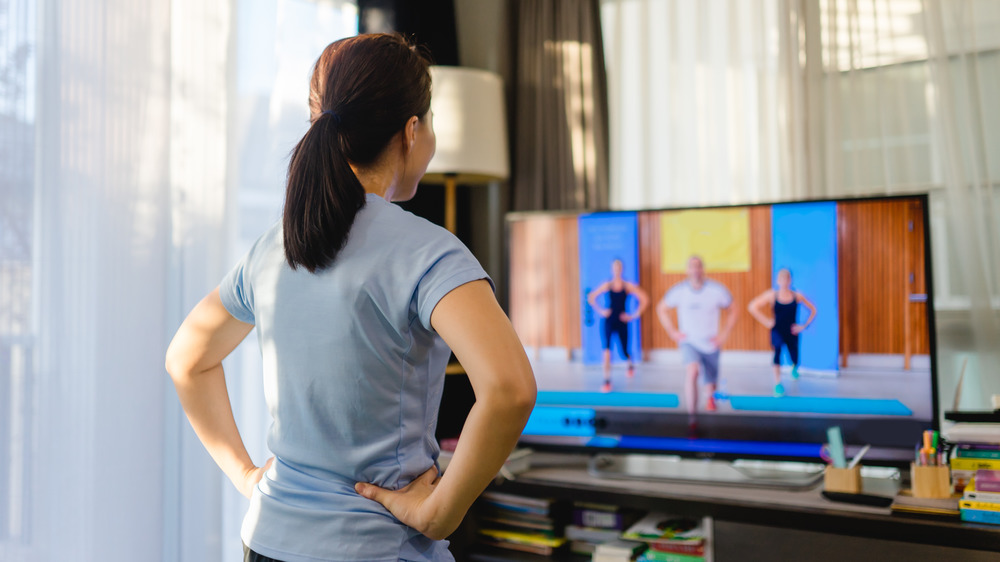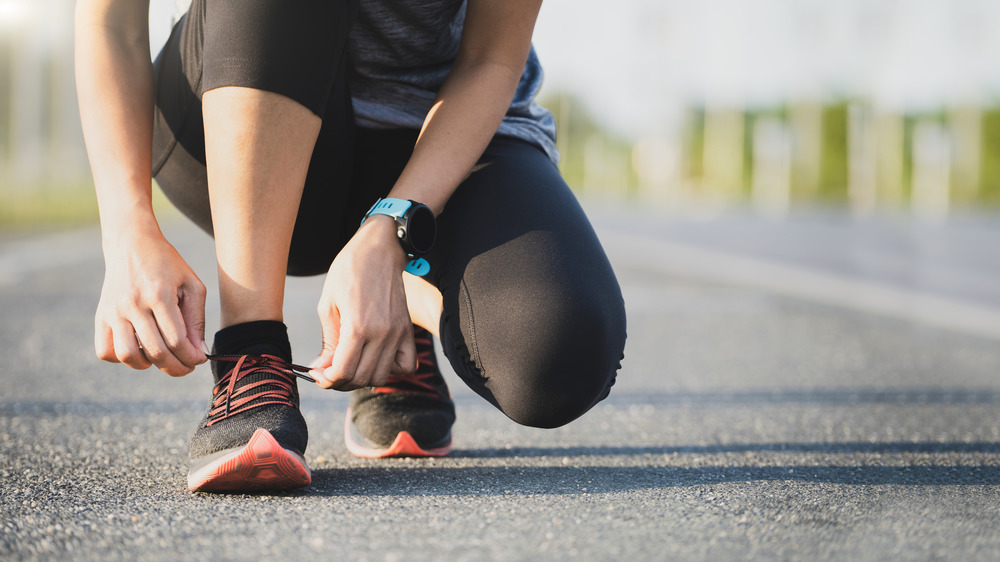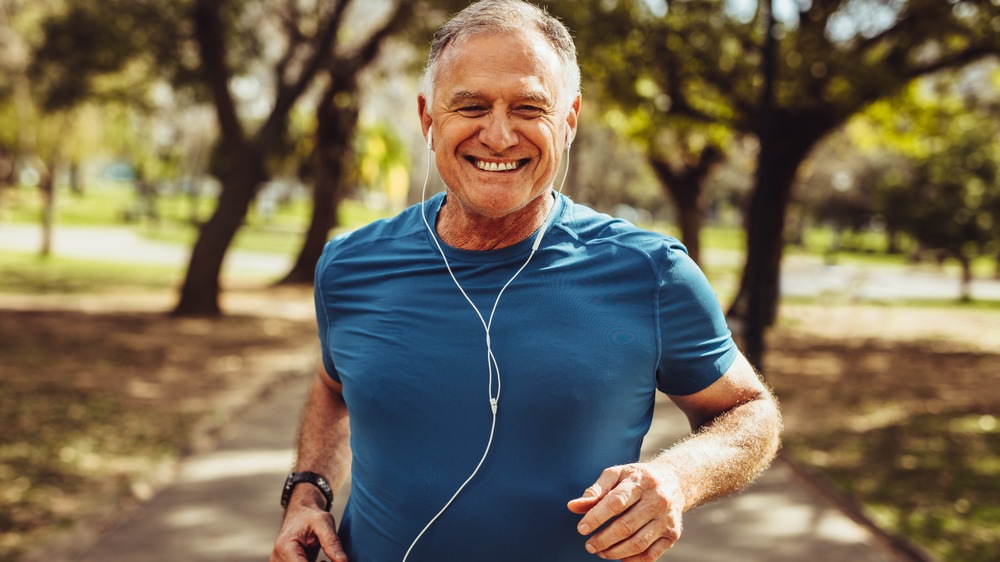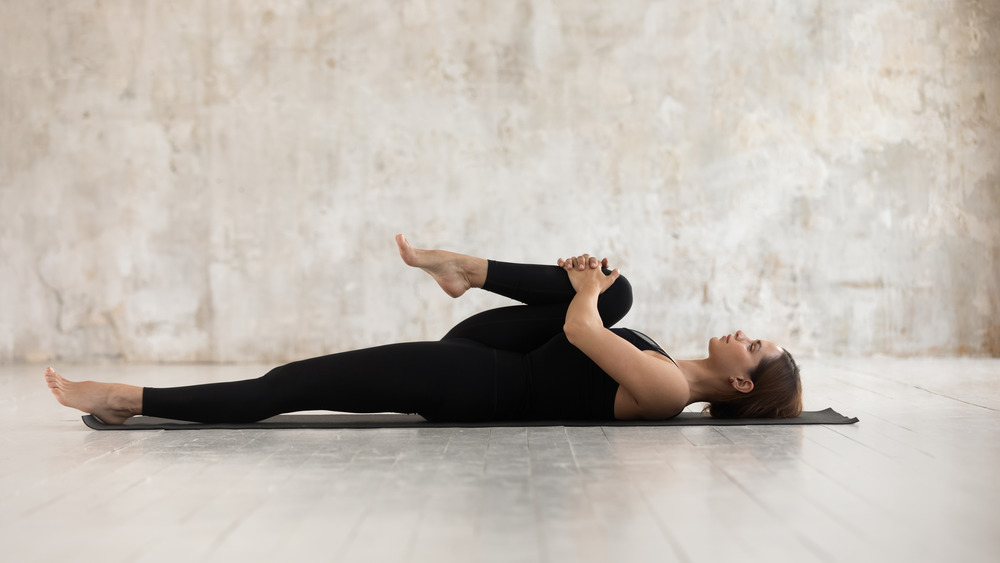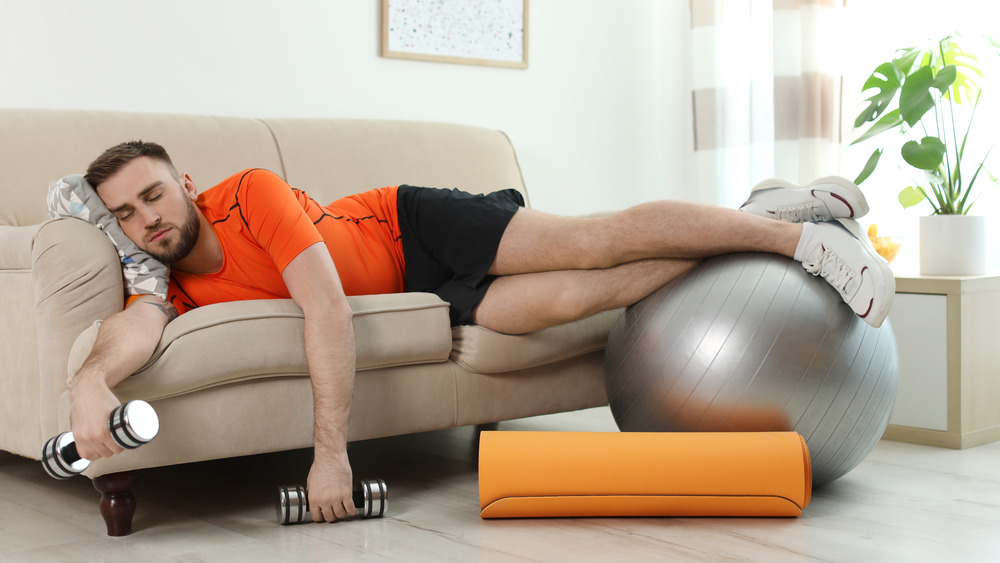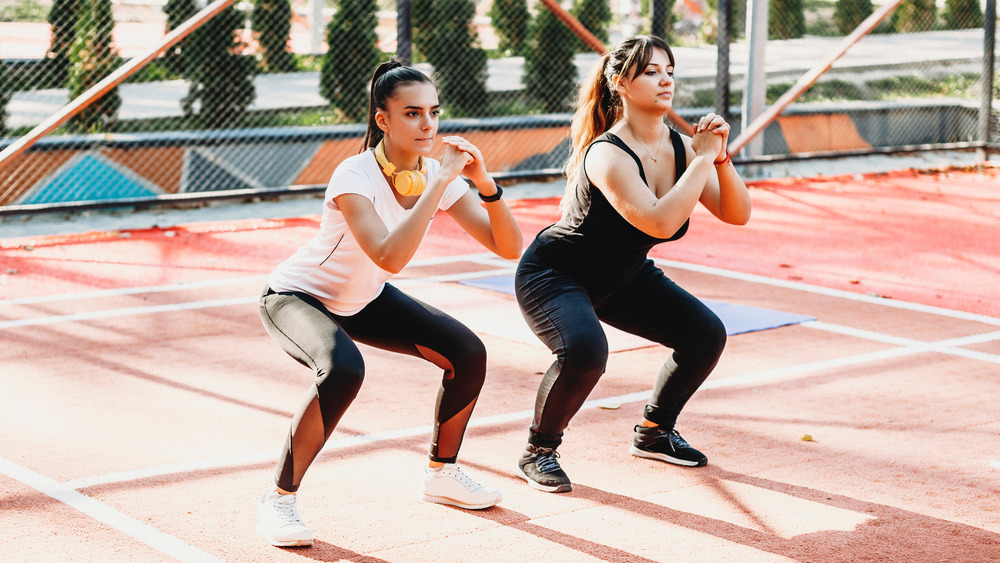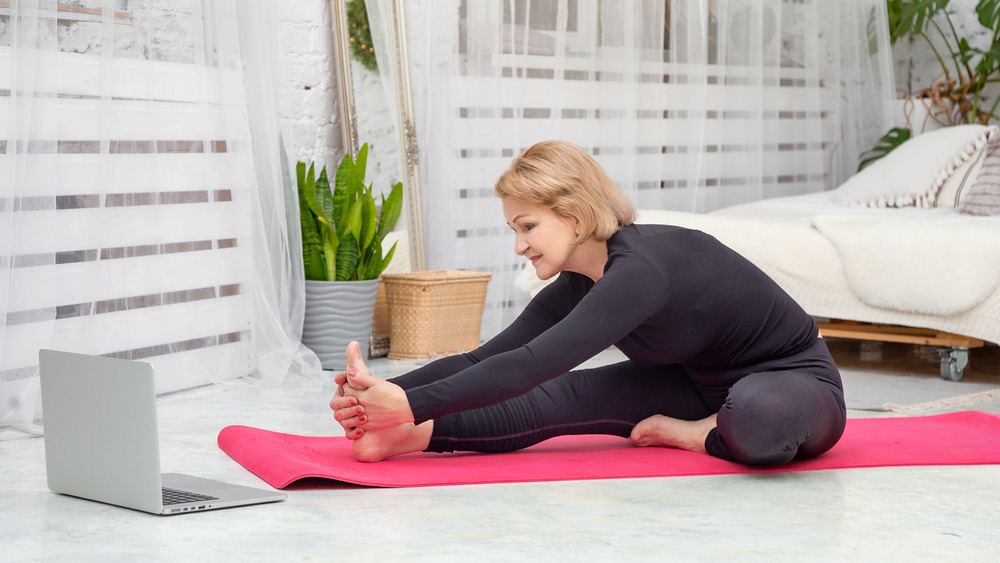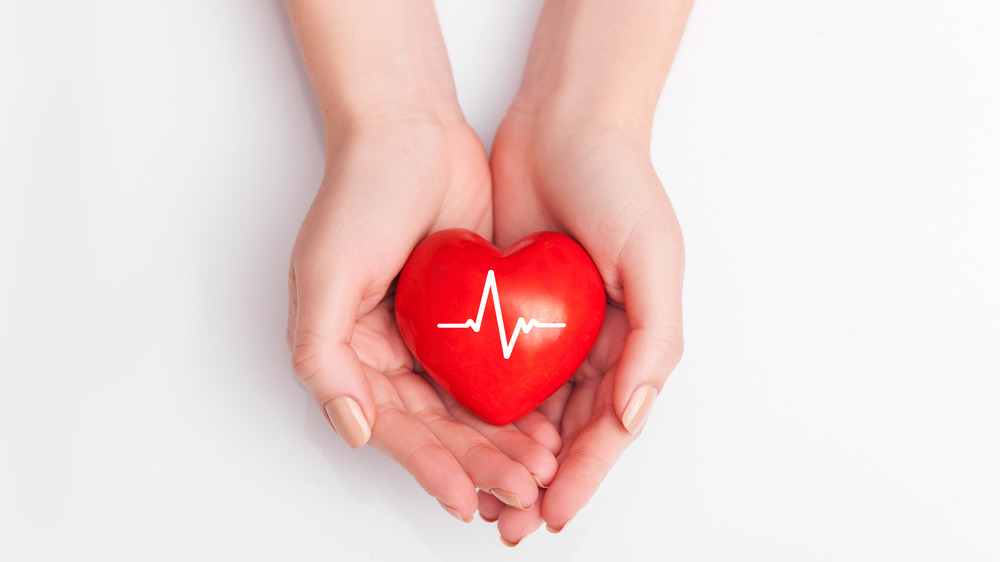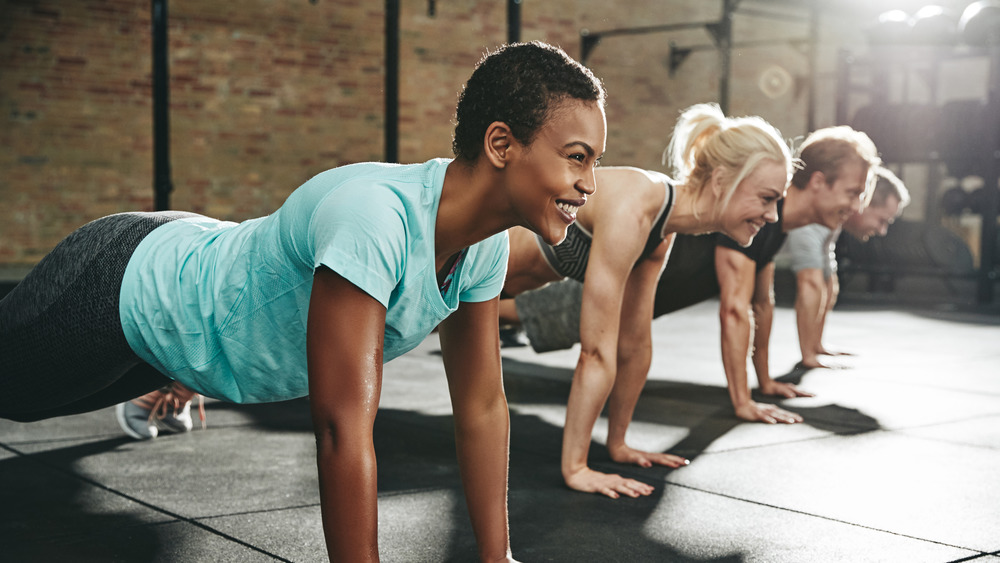When You Start Exercising, This Is What Happens To Your Body
Whether you're starting an exercise plan for the very first time (which is awesome!) or coming back to your fitness routine after a break (equally as awesome!), the positives of committing to exercise can't be understated. Regular exercise benefits us in more ways than we can count, including things beyond the obvious — such as improving our brainpower and stress levels, and even improving relationships, according to WebMD.
Although a lot of us know the benefits of exercise, what we can be less clear about is the actual physical process that occurs in the body when you start exercising — and the science behind it is not only fascinating but helps to clarify exactly why exercise is so beneficial. So, in this article, we've taken a look at the short-, medium-, and long-term effects that occur when you hit the streets for a jog, hop on the exercise bike, or lift some weights. Give it a read and you'll be lacing up those new sneakers in no time.
Exercise puts your body under stress, releasing adrenaline
One of the first changes that happens in your body when you begin an exercise routine — and which can even happen before you're getting ready for a workout, according to MedlinePlus – is the increased production and release of hormones. Exercise puts your body under a certain amount of physical stress, essentially creating a fight-or-flight response, which causes you to produce more epinephrine (more commonly known as adrenaline).
As a 2008 study published in Sports Medicine found, production of epinephrine is much higher when exercising in order to stimulate the body's systems to accommodate the stress under which the body is placed. It also shows that the more you train, the more your body produces epinephrine. And as you become more efficient at exercising and can work out with more intensity, your body helps to adjust.
Adrenaline release can also lead to an increase in alertness, explaining why many people feel their senses sharpen during exercise (via Harvard Health Publishing). In a sense, the hormone release allows your body to cope with the increased physical activity — and importantly, allowing the heart to work more efficiently.
Epinephrine increases your heart rate and improves your circulation
We all know the feeling of our heart beating faster when we're shocked or scared, right? Well, that's down to the body releasing epinephrine . And during exercise, a similar process occurs to allow your body to react to the physical exertion (via MedlinePlus).
The epinephrine (aka adrenaline) released when your body undertakes exercise causes you to have more energy and your heart to start working harder. When this happens, your pulse will quicken and circulation is increased around your body, in order to supply your muscles with more blood and the oxygen that is delivered with it (via UC Davis Health). Doing this allows the muscles to work more efficiently, remain oxygenated, and get ready to react to further stress caused by exercise.
Cortisol may also be released in addition to adrenaline. Although this is more common in "intense exercise," according to Healthline, cortisol levels can increase during moderate exercise in "unfit individuals." And this temporary boost of cortisol "promotes the release of energy," according to Medline Plus.
You'll experience a boost in mood when starting an exercise routine
Ever wonder why people speak so rhapsodically about the "runner's high," or the feeling of elation after a spell of exercise? Well, there's science behind the phenomenon.
During your exercise — or shortly afterward — you're likely to feel a significant positive increase in your mood. This is due to the increase of several hormones known as "endogenous opioids" in your brain following a significant bout of physical exertion, according to a 2017 study published in Brain Plasticity. These hormones are associated with "pain modulation, reward, response to stress, and autonomic control," which essentially provide us with positive feelings.
These endogenous opioids include the all-important endorphins, a key component in feelings of happiness and a big reason why most people are left buzzing and energized when they've just completed their first workout. And thankfully, this feeling doesn't just occur the first time you exercise; you'll continue to receive this boost no matter how far you get into your fitness journey (via WebMD).
You'll probably feel a little sore the day after your first workout
While feelings of happiness and elation can last for some time after an exercise session, they eventually wear off as you rest. And if you're just starting to exercise, you might find that they can be replaced by pain in your muscles the following day.
If this happens, no need to fret: It's most likely a case of Delayed Onset Muscle Soreness (or DOMS). For muscles that aren't accustomed to exercise, placing additional loads on them through physical activity can cause them to become sore. While the jury's still out on the exact cause of DOMS, most experts believe that it's due to microscopic damage caused to muscle fibers during exercise (via American College of Sports Medicine).
DOMS can be off-putting for those who are new to exercise, but it's useful to remember that even people who have exercised daily for years experience occasional soreness — and the pain lessens the more that you work out. DOMS will generally pass within a few days and unless the pain is debilitating, it's totally normal. It just means your muscles are repairing and getting stronger, according to the American College of Sports Medicine.
You may feel a little tired after you start exercising
It's not unusual for people to experience some post-workout tiredness — particularly if you're just starting to incorporate substantial exercise into your routine. As with soreness, this is totally natural. As Healthline noted: When our bodies undergo physical activity, our muscles contract over and over again, using a molecule called adenosine triphosphate (ATP) that provides energy for our cells to do so.
When exercising, your supply of ATP decreases, resulting in peripheral fatigue (aka muscle fatigue). This alongside our central nervous system response (which fires repeated signals to activate our muscles) as well as a rapid increase of the hormones serotonin and dopamine all lead to our body becoming worn out after a workout, and us feeling incredibly tired.
As Healthline indicated, though, it's important to stretch and rehydrate before reaching for the pillow, and make sure you limit your naps to short periods of time. It's important not to let exercise fatigue interrupt your regular sleep, and your body will acclimate.
As you continue to exercise, your body will build up something called mitochondria
So, you've successfully started your workout plan: Congratulations! Starting a new, healthy routine is a big deal. But after the initial exercise high wears off, you might be wondering how repeated exercise benefits you.
Moving into sustained exercise in the medium term, your body will continue to see incredible changes. One of the ways regular exercise benefits, especially interval training, us is through the build-up of mitochondria, which are organelles — almost like an organ for your individual cells, which performs a specific job to help your cell function. Mitochondria are responsible for the production of adenosine triphosphate (ATP), according to Medical News Today. As we age, the capability of mitochondria to create energy wanes.
However, a study led by Dr. Sreekumaran Nair, a diabetes researcher at the Mayo Clinic, found that sustained regular exercise can lead to significant increases in your mitochondrial capacity (via Medical News Today). This means that when we regularly exercise, we're providing our bodies with the ability to keep generating energy, allowing them to perform better in almost every way and, essentially, slowing the aging process.
Mitochondria can help protect against chronic diseases
An increase in mitochondria from exercise brings a host of benefits — one of the most notable is the ability to help guard against numerous chronic or long-term diseases. In his study of mitochondria published in Integrative Medicine International, Joseph Pizzorno, a renowned naturopathic physician, detailed a lengthy list of long-term and chronic diseases caused by mitochondrial dysfunction, including Alzheimer's disease, dementia, diabetes, and Parkinson's.
While the study only indicates that mitochondrial dysfunction is associated with such diseases — and while it's important to remember that mitochondrial dysfunction can occur from many factors — it follows that good levels of mitochondria in cells can help to protect against them. So, as you increase your mitochondria by regular exercise, you're helping protect your health.
As Pizzorno stated in his study: "With such a long list of common diseases now caused by or aggravated by mitochondrial dysfunction, it is difficult to overstate its importance." As you start to exercise more regularly, take a moment to think about the huge benefits it could have in the long term — you won't regret it further down the line.
After about six months of exercise, your heart will get bigger and stronger
Being big-hearted isn't just for those people with loads of compassion. As your exercise becomes a habit, changes to your heart will occur. Amazingly after around six months or so of repeated significant physical activity, your heart will have actually grown in size, in addition to becoming stronger.
Professor Robert Newton, director of Edith Cowan University's Exercise Medicine Research Institute, told 9Honey, "In response to all the fast pumping and stretching it has been going through, your heart has grown and has become more efficient." He also indicated that as this happens, our resting heart rates also decrease, due to our hearts becoming stronger and being able to expel more blood with each contraction, meaning they don't have to do so as frequently. Pretty cool, right?
The correlation between heart health and exercise is a well-known one. As a study published in Circulation found, cardiovascular health is consistently improved by frequent exercise. So if the image of a big heart wasn't enough to motivate you, knowing that it's working better just might.
Your muscles will get bigger some months after you start exercising
One of the most obvious changes to occur to your body when you start exercising isn't within ; the more frequently and consistently we exercise, the more our muscles grow and strengthen, leading to a leaner, more muscular physique.
Although many people start exercising with the desire to look more fit or muscular, it's important to remember that this takes time and consistency and doesn't happen overnight. It can take around three to six months for real visible changes to occur and for your muscles to feel more efficient, personal trainer Ella Martyn explained to Women's Health.
Keep in mind that nutrition plays an important part when it comes to sustaining an exercise habit, particularly if you're starting to exercise to see your muscles grow. As a study in the International Journal of Sport Nutrition and Exercise Metabolism found, muscle growth only occurs if the body is adequately nourished with food, especially protein. If you're eating too little, your body enters a "catabolic" state, which means that you're losing mass, either fat or muscle. To maintain and improve performance, nourish with good food.
Your bones will strengthen as you continue exercising
As you continue to exercise, your bones will get stronger and your bone mass density will increase. Our bone mass tends to peak in young adulthood and then reduce throughout our lives. However, Harvard's Healthbeat explained that weight-bearing exercise — e.g. aerobic, strength, and power training — puts stress on our bones, which then results in our bodies producing extra deposits of calcium and stimulating bone-forming cells. Done repeatedly with a regular exercise regime, the result is a stronger, healthier skeleton.
However, as the article indicated, only the bones that are actually bearing weight will be benefiting, as they're the ones reacting to the stress of the weight. It's also typically higher-impact exercises as opposed to low-impact movements that have more of an effect on bone density. Essentially, the harder you're working, the stronger your bones are getting.
This is all the more reason to try to develop a full-body approach to exercise, though. So if you're a regular runner by this point, consider incorporating some upper-body work into your routine now and again. Your bones will thank you!
You'll likely feel consistently less fatigued and more alert as exercise becomes a habit
It sounds counterproductive that regular bursts of more intense physical activity would actually give you more energy , but as your body continues to adapt to long-term regular exercise, you'll find yourself feeling more energized in your day-to-day life.
In an analysis of over 70 studies focused on exercise and fatigue, researcher Patrick O'Connor, co-director of the University of Georgia exercise psychology laboratory, found a pretty clear result: "More than 90% of the studies showed the same thing: Sedentary people who completed a regular exercise program reported improved fatigue compared to groups that did not exercise" (per WebMD).
This isn't just true for healthy adults, either. The study found that almost every group studied (including those with chronic illnesses such as heart disease or diabetes) felt positive effects on their energy levels. So while exercise may be tiring in the short term, the long-term benefit it can have on your energy levels is huge. Next time you're feeling a little sleepy, a short jog could help!
Your mental health will improve when you start exercising
Exercising can leave you feeling temporarily buzzing off the feat of running a 5K, but it can help your mental health in the longer term, too. A 2011 study in Psychotherapy and Psychosomatics showed that an introduction of regular exercise can significantly help reduce worry symptoms in the short-term for those who experience generalized anxiety disorder (or GAD). Another study published in Frontiers in Psychiatry pointed to the long-term potential for exercise to impact positively on people who frequently experience anxiety. This is due to exercise promoting the growth of new neurons in the brain capable of regulating mood more effectively.
It's worth pointing out, though, that while exercise has proven benefits on mental health, it is not a substitute for medical treatment. Nonetheless, with the copious other benefits that both short- and long-term exercise has for your body and mind, it could help you see improvements.
Starting an aerobic exercise routine can lead to improved muscle strength
When you think of muscle-strengthening activities, you might picture people grunting and sweating in a gym, lifting weights – lots of weights. Strength needn't just be about bodybuilding, though. With consistent, long-term aerobic exercise, your muscles will get stronger.
A study published in The Journals of Gerontology: Series A found that despite the typical view of aerobic exercise being to purely benefit cardiovascular health, it can seriously improve muscle strength across many age groups. In a comparison between those performing long-term aerobic exercise and sedentary subjects, the study found that muscle strength, lean muscle mass, and muscle-based performance were higher across all groups, measured through isometric grip and knee extensor strength exercises.
The study did note, though, that just performing aerobic exercises like running may not have a huge effect on muscle strength. Instead, full-body aerobic exercise may have a greater effect overall. Regardless, alongside strengthening your heart, cardiovascular-focused exercises seem to strengthen your whole body in the long run.
Starting an exercise routine could lead to a lifelong healthy habit
Naturally, we all want to meet our health goals. But if you're at the very start of your exercise journey, it can feel daunting to think about exercising every day, or almost every day, forever.
The most important aspect of establishing a long-term exercise routine, though, is sticking with it long enough to make it a habit. Professor Robert Newton, director of Edith Cowan University's Exercise Medicine Research Institute, told 9Honey that exercising regularly for around a year can help establish a long-term habit: "It's a good addiction because these are natural drugs and by 12 months, you are pretty well hooked on these drugs," he explained.
Once you get to this point, your body will have adapted to the changes in routine and the many benefits that come with it. You'll have your favorite workouts and you'll want to do them. Plus, you'll know how your body reacts to certain movements and you'll enjoy every workout (well, most of them, anyway) So, if you're about to start exercising for the first time, know that before long it'll feel totally natural — and the results could very well change your life. See you on the track!

